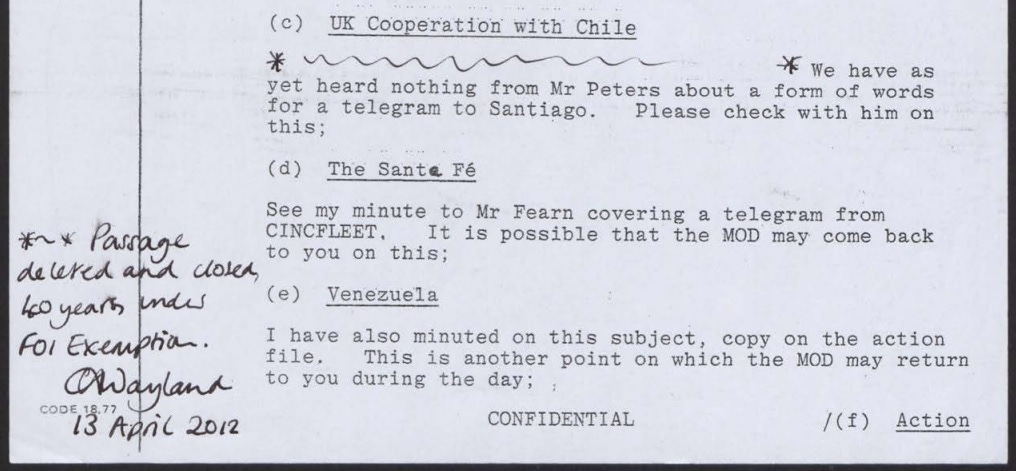Question 4
Why was public access to all incoming telegrams sent during the Falklands Conflict embargoed until 2052, or a further 40 years?
During her now infamous appearance on BBC Nationwide in May 1983, Mrs Thatcher promised the UK public that all high-level documents relating to the Falklands Conflict would be revealed in 30 years’ time. She also used this TV appearance to curry favour with voters just prior to the June 1983 general election.
Imagine the British public's shock and disappointment when, come the year 2012, her promise was broken and many secret or confidential documents and passages from them were put under lock and key for a further 40 years.
Included within these would have been a telegram sent on Saturday 1st May 1982 by Britain’s Ambassador to Peru Charles Wallace, based in the capital city, Lima.
Mr Wallace had been central to Peruvian President Fernando Berlaund Terry's drawing up of a peace proposal, aimed at rescuing what had become an extremely tense situation. Mr Wallace’s telegram would have been sent in good faith, and would have detailed all seven points of these proposals.
But Mrs Thatcher failed to acknowledge receipt and permitted her forces - in the shape of nuclear submarine HMS Conqueror - to torpedo and sink the Argentine cruiser ARA General Belgrano the very next day, with the loss of 368 sailors, including over 100 young conscripts.
At the same TV appearance a year later, and with little sense of remorse, Mrs Thatcher claimed the crucial telegram had not been received until ‘after the attack’ or 17 hours later.
As a former Royal Navy radio communicator with knowledge in this field, I believe in hindsight that the telegram would have been received almost immediately, she was lying and had compounded this by continuing to falsely claim allegiance to the ‘paramount’ interests of the Falkland Islanders.
And for today's UK Establishment to raise the drawbridge, preventing public access to not just this telegram, but to all incoming telegrams sent during the conflict, is an act of institutional cowardice.
To arbitrarily and callously conceal this truth from British and Argentine citizens - including the families of the dead - for a total of 70 years reveals the desperately defensive and corrupted, collective mindset of this UK establishment, the same one that with the support of the United States had invaded and stolen the Chagos Islands from its native people and from Mauritius in1965. The population had been banished to make way for the building of a strategic military base.
Although the Falkland Islanders’ grievances are now resolved, the Chagos Islanders still await repatriation to their homeland (since renamed Diego Garcia) 57 years later.


